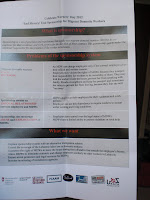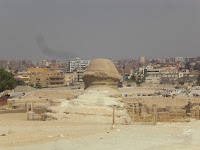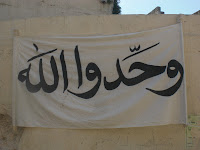You see them everywhere, yet you never really see them. In a country of many groups, minorities and interests, all vying for influence and fair conditions, Lebanon's forgotten minority is its migrant workers. All Lebanese citizens are ethnically Arab or Armenian (due to an influx of refugees from Turkey at the start of the 20th century). But the country's residents are not so homogeneous. Employed as construction workers, refuse collectors, nannies, maids and in a range of other unskilled capacities, migrant workers have steadily flowed into the country in recent years, bulking out the working classes in and around central Beirut as the locals prosper.
 In order to gain a working visa, these migrants must first obtain a 'sponsorship' from their would-be employer. Working visas can cost thousands of dollars and sponsorships are non-transferable. In other words, once your host employer has 'bought' you, you are stuck with them. This can result in appalling working and living conditions and terrible pay, which drives many foreign workers to the brink - stories of deaths caused by both suicide and accidents are common.
In order to gain a working visa, these migrants must first obtain a 'sponsorship' from their would-be employer. Working visas can cost thousands of dollars and sponsorships are non-transferable. In other words, once your host employer has 'bought' you, you are stuck with them. This can result in appalling working and living conditions and terrible pay, which drives many foreign workers to the brink - stories of deaths caused by both suicide and accidents are common. On 29th April, migrant workers had the chance to be noticed for a change. Staging a peaceful demonstration, a colourful crowd from Sri Lanka, Ethiopia, The Phillippines, India, Kenya, Nepal, DR Congo, and a host of others marched across town. That morning, walking through town to join the demonstration, I passed a
refuse collector of South Asian origin, quietly going about his work on
a bridge. Fortunately, plenty of people did have Sunday off and there was a party atmosphere, with African drumming and dancing accompanying Asian chanting, and banners and t-shirts proclaiming 'Proud to Be An African' or 'I Love Nepal'.
On 29th April, migrant workers had the chance to be noticed for a change. Staging a peaceful demonstration, a colourful crowd from Sri Lanka, Ethiopia, The Phillippines, India, Kenya, Nepal, DR Congo, and a host of others marched across town. That morning, walking through town to join the demonstration, I passed a
refuse collector of South Asian origin, quietly going about his work on
a bridge. Fortunately, plenty of people did have Sunday off and there was a party atmosphere, with African drumming and dancing accompanying Asian chanting, and banners and t-shirts proclaiming 'Proud to Be An African' or 'I Love Nepal'.
As the crowd progressed along some of East Beirut's main streets it grew in size. Crossing back across the bridge in the other direction, the refuse collector was nowhere to be seen. Onlookers, Lebanese and otherwise, looked on and cheered. The final destination of the march was the courtyard outside the large St. Joseph's church. On arrival, the pace and volume of the drumming intensified and impromptu dancing broke out.
 There followed a concert of traditional and less traditional dancing and music. The standard varied wildly, including a superb display of Ethiopian dancing, presumably the original inspiration for robot-dancers everywhere, to a solo by a little Indian girl, a Phillippino choir singing Michael Jackson and a bizarre miming of a Sean Paul song.
There followed a concert of traditional and less traditional dancing and music. The standard varied wildly, including a superb display of Ethiopian dancing, presumably the original inspiration for robot-dancers everywhere, to a solo by a little Indian girl, a Phillippino choir singing Michael Jackson and a bizarre miming of a Sean Paul song.The overall theme of the day seemed to be unification, with different cultures and people uniting behind one message while showing their individuality at the same time. It was a convincing case. There is no reason why a well-developed and educated country like Lebanon, regardless of its other problems, cannot treat its migrant workers like human beings.































